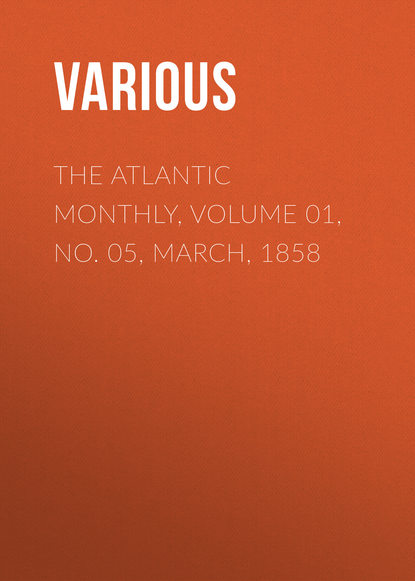По всем вопросам обращайтесь на: info@litportal.ru
(©) 2003-2024.
✖
The Atlantic Monthly, Volume 01, No. 05, March, 1858
Автор
Год написания книги
2018
Настройки чтения
Размер шрифта
Высота строк
Поля
Shortly, an Englishman comes, who says he has been to St. Peter's,
Seen the Piazza and troops, but that is all he can tell us;
So we watch and sit, and, indeed, it begins to be tiresome.—
All this smoke is outside; when it has come to the inside,
It will be time, perhaps, to descend and retreat to our houses.
Half-past one, or two. The report of small arms frequent,
Sharp and savage indeed; that cannot all be for nothing:
So we watch and wonder; but guessing is tiresome, very.
Weary of wondering, watching, and guessing, and gossipping idly,
Down I go, and pass through the quiet streets with the knots of
National Guards patrolling and flags hanging out at the windows,
English, American, Danish,—and, after offering to help an
Irish family moving en masse to the Maison Serny,
After endeavoring idly to minister balm to the trembling
Quinquagenarian fears of two lone British spinsters,
Go to make sure of my dinner before the enemy enter.
But by this there are signs of stragglers returning; and voices
Talk, though you don't believe it, of guns and prisoners taken;
And on the walls you read the first bulletin of the morning.—
This is all that I saw, and all I know of the battle.
VI.—CLAUDE TO EUSTACE
Victory! Victory!—Yes! ah, yes, thou republican Zion,
Truly the kings of the earth are gathered and gone by together;
Doubtless they marvelled to witness such things, were astonished,
and so forth.
Victory! Victory! Victory!—Ah, but it is, believe me,
Easier, easier far, to intone the chant of the martyr
Than to indite any paean of any victory. Death may
Sometimes be noble; but life, at the best, will appear an illusion,
While the great pain is upon us, it is great; when it is over,
Why, it is over. The smoke of the sacrifice rises to heaven,
Of a sweet savor, no doubt, to somebody; but on the altar,
Lo, there is nothing remaining but ashes and dirt and ill odor.
So it stands, you perceive; the labial muscles, that swelled with
Vehement evolution of yesterday Marseillaises,
Articulations sublime of defiance and scorning, to-day col-
Lapse and languidly mumble, while men and women and papers
Scream and re-scream to each other the chorus of Victory. Well, but
I am thankful they fought, and glad that the Frenchmen were beaten.
VII.—CLAUDE TO EUSTACE
So I have seen a man killed! An experience that, among others!
Yes, I suppose I have; although I can hardly be certain,
And in a court of justice could never declare I had seen it.
But a man was killed, I am told, in a place where I saw
Something; a man was killed, I am told, and I saw something.
I was returning home from St. Peter's; Murray, as usual,
Under my arm, I remember; had crossed the St. Angelo bridge; and
Moving towards the Condotti, had got to the first barricade, when
Gradually, thinking still of St. Peter's, I became conscious
Of a sensation of movement opposing me,—tendency this way
(Such as one fancies may be in a stream when the wave of the tide is
Coming and not yet come,—a sort of poise and retention);
So I turned, and, before I turned, caught sight of stragglers
Heading a crowd, it is plain, that is coming behind that corner.
Looking up, I see windows filled with heads; the Piazza,
Into which you remember the Ponte St. Angelo enters,
Since I passed, has thickened with curious groups; and now the
Crowd is coming, has turned, has crossed that last barricade, is
Here at my side. In the middle they drag at something. What is it?
Ha! bare swords in the air, held up! There seem to be voices
Pleading and hands putting back; official, perhaps; but the swords are
Many, and bare in the air,—in the air! They descend! They are smiting,
Hewing, chopping! At what? In the air once more upstretched! And
Is it blood that's on them? Yes, certainly blood! Of whom, then?
Over whom is the cry of this furor of exultation?
While they are skipping and screaming, and dancing their caps on the
points of
Swords and bayonets, I to the outskirts back, and ask a
Mercantile-seeming bystander, "What is it?" and he, looking always
That way, makes me answer, "A Priest, who was trying to fly to
The Neapolitan army,"—and thus explains the proceeding.
You didn't see the dead man? No;—I began to be doubtful;
I was in black myself, and didn't know what mightn't happen;—
But a National Guard close by me, outside of the hubbub,
Broke his sword with slashing a broad hat covered with dust,—and
Passing away from the place with Murray under my arm, and
Stooping, I saw through the legs of the people the legs of a body.
You are the first, do you know, to whom I have mentioned the matter.
Whom should I tell it to, else?—these girls?—the Heavens forbid it!—
Quidnuncs at Monaldini's?—idlers upon the Pincian?
If I rightly remember, it happened on that afternoon when
Word of the nearer approach of a new Neapolitan army
First was spread. I began to bethink me of Paris Septembers,
Thought I could fancy the look of the old 'Ninety-two. On that evening,
Three or four, or, it may be, five, of these people were slaughtered.
Some declare they had, one of them, fired on a sentinel; others
Say they were only escaping; a Priest, it is currently stated,
Stabbed a National Guard on the very Piazza Colonna:











